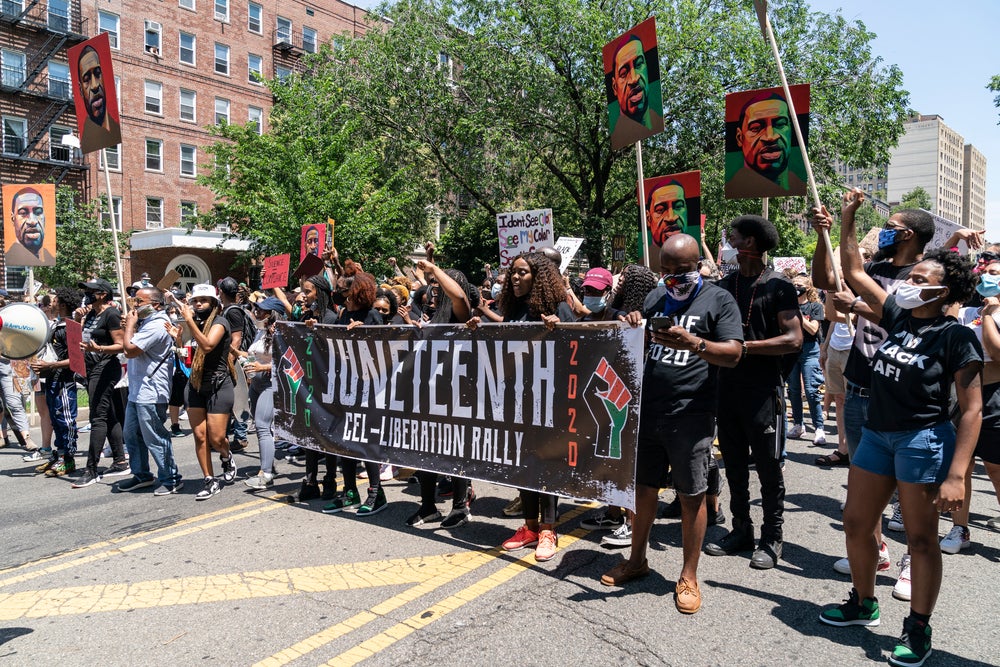Banner artwork by Lightspring / Shutterstock.com
What is Juneteenth?
Juneteenth, also known as “Emancipation Day,” “Freedom Day,” “Black Independence Day,” and a plethora of other names, also, short for “June Nineteenth,” marks the day emancipated enslaved African Americans got news of their newfound freedom from federal troops that arrived in Galveston, Texas, in 1865. This occurred nearly two years after President Abraham Lincoln’s Emancipation Proclamation on January 1, 1863, which declared more than three million enslaved people living in the Confederate states to be free. Juneteenth became an official state holiday in Texas in 1980 and a federal holiday on June 17, 2021, when it was signed into law by US President Joe Biden. Juneteenth will continue to be a day of historical significance honoring the end of slavery and celebrating the culture of African Americans.
What do in-house counsel need to know about Juneteenth?
Legal recognition and obligations
Juneteenth's designation as a federal holiday means that it is now a recognized public holiday nationwide. In-house lawyers should be aware of any legal obligations or implications related to recognizing this holiday, such as employee holiday policies, paid time off, and compliance with state and federal regulations.
Cultural sensitivity and workplace diversity
Juneteenth is a significant day for African Americans and symbolizes freedom and emancipation from slavery. In-house lawyers should advise their organizations on fostering a culturally sensitive workplace environment that acknowledges and respects the cultural significance of Juneteenth for employees of African descent.
Corporate social responsibility (CSR)
Many organizations choose to commemorate Juneteenth as part of their corporate social responsibility initiatives. In-house lawyers may advise on how their company can participate in community events, support relevant causes, or engage in educational programs that honor Juneteenth and promote diversity, equity, and inclusion.
Legal education and training
In-house lawyers can facilitate training sessions or provide resources to educate employees about the history and significance of Juneteenth. This can help promote understanding and foster a more inclusive workplace environment.
Policy review and updates
In light of Juneteenth becoming a federal holiday, in-house lawyers should review existing policies related to holidays, paid time off, diversity initiatives, and cultural observances. Updates may be necessary to ensure compliance with legal requirements and to reflect the organizational commitment to diversity and inclusion.
Public statements and communications
In-house lawyers may also advise on crafting internal and external communications regarding Juneteenth. This includes ensuring that messages are respectful, accurate, and aligned with the company's values and diversity initiatives.
So how do I celebrate?
Celebrated in different ways, Juneteenth’s traditions, foods, and festivities allow us today to recognize and pay homage to this special day.
Red is a traditional color that is used to signify transition, power, strength, unity, sacrifice, and respect. It also symbolizes bloodshed; the blood of the many enslaved ancestors that died and suffered during the Atlantic slave trade. Red is also a color used to embrace southern dishes. When commemorating with others at Juneteenth gatherings, these vibrant color foods may be served:
Traditional foods: strawberries, watermelon, red velvet cake, red beans and rice, BBQ, strawberry soda, hibiscus tea
There are plenty of festivities that take place on Juneteenth, including religious services, beauty pageants, festivals, parades, block parties, and educational events. Music and art festivals are also events individuals can attend to celebrate, watch entertainment, dance and sing negro spirituals, support black-owned vendors and businesses, and learn more knowledge about Juneteenth and its history.

Today’s Juneteenth
“Today on Juneteenth, the day we celebrate the end of slavery, the day we memorialize those who offered us hope for the future and the day when we renew our commitment to the struggle for freedom." — Angela Davis
Today, Juneteenth is more publicly known now, and became a much more visible federal holiday in different communities and races. It is the longest-running African American holiday to date. June 19 remains a day to reflect on the history of slavery, African American freedom, racial injustice, equality, and the present and ongoing challenges that African Americans still face today.
Disclaimer: The information in any resource in this website should not be construed as legal advice or as a legal opinion on specific facts, and should not be considered representing the views of its authors, its sponsors, and/or ACC. These resources are not intended as a definitive statement on the subject addressed. Rather, they are intended to serve as a tool providing practical guidance and references for the busy in-house practitioner and other readers.




